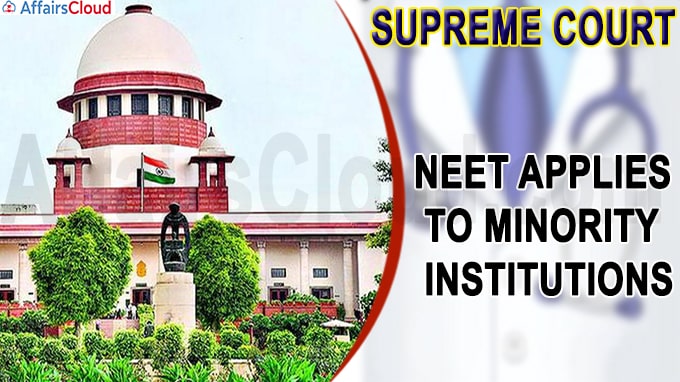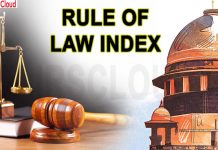Table of contents
- Brief overview
- Background of the case
- Appeal and litigation
- Static Information
- SC judgement
- Remarks Given by SC bench
Brief Overview-
Verdict in Brief –
There is no fundamental right violation in prescribing National Eligibility cum Entrance Test (NEET) for admissions in medical and dental courses across aided and unaided minority professional institutes.
| SC Bench | Arun Mishra, Vineet Saran, MR Shah |
| Date of Judgement | 29th April 2020 |
Background
- The uniform entrance test concept was proposed with the intention to check several malpractices in admission to medical education.
- Accordingly, notifications for an all India uniform NEET examination was issued by the Medical Council of India and the Dental Council of India in December 2010.
- In 2016, the notifications were included as statutory provisions under section 10D of the Medical Council of India Act and the Dentists Act. In essence the MCI Act and Dentists Act were amended.
Appeals & litigation against the notification
A petition headed by Christian medical College (CMC), Vellore had appealed against this amendment.
The primary argument was that-
- The private unaided institutes had their own admission tests and criteria for student’s admission and NEET should not be imposed on them.
- Imposing NEET would violate the institutions’ fundamental rights of religious freedom, to manage their religious affairs, to administer their institutions.
- They said the State was reneging its obligation to act in the best interest of minorities.
- the NEET notification violated the fundamental rights of an unaided minority institution to “establish and administer educational institutions of their choice” protected under the Constitution (Primarily Article 30), which includes the right to admit students of their own choice.
…………………………………………………………………………………………………………………………………………………..
Article 30 – Right of minorities to establish and administer educational institutions
(1) All minorities, whether based on religion or language, shall have the right to establish and administer educational institutions of their choice
(2) The state shall not, in granting aid to educational institutions, discriminate against any educational institution on the ground that it is under the management of a minority, whether based on religion or language
Article 26 – Freedom to manage religious affairs Subject to public order, morality and health, every religious denomination or any section thereof shall have the right
(a) to establish and maintain institutions for religious and charitable purposes;
(b) to manage its own affairs in matters of religion;
(c) to own and acquire movable and immovable property; and
(d) to administer such property in accordance with law
Article 29 – Protection of interests of minorities
29(1) Any section of the citizens residing in the territory of India or any part thereof having a distinct language, script or culture of its own shall have the right to conserve the same
…………………………………………………………………………………………………………………………………………………..
Highlights of the SC judgement
The judgment held that by prescribing NEET, a uniform entrance examination the court “intends to weed out evils from the system and various malpractices which decayed the system.”
Also the Court Noted-
- “The rights available under Article 30 are not violated by the provisions in Section 10D of the MCI Act and the Dentists Act and Regulations framed by MCI/DCI,”
- “The right to freedom of trade or business is not absolute. It is subject to “reasonable restriction in the interest of the students’ community to promote merit”
- The rights granted under the constitution, “do not come in the way of securing transparency and recognition of merits in the matter of admissions. It is open to regulating the course of study, qualifications for ensuring educational standards.” It is open to imposing reasonable restrictions in the national and public interest.”
- The minority institutions are equally bound to comply with the conditions imposed under the relevant Acts and Regulations to enjoy affiliation and recognition.
- Specific measures to make the administration of professional educational institutions transparent can be imposed.
- “Uniform Entrance Test qualifies the test of proportionality and is reasonable. It is intended to prevent capitation fee by and to prevent exploitation, profiteering, and commercialization of education”
——————————————————————————————————





